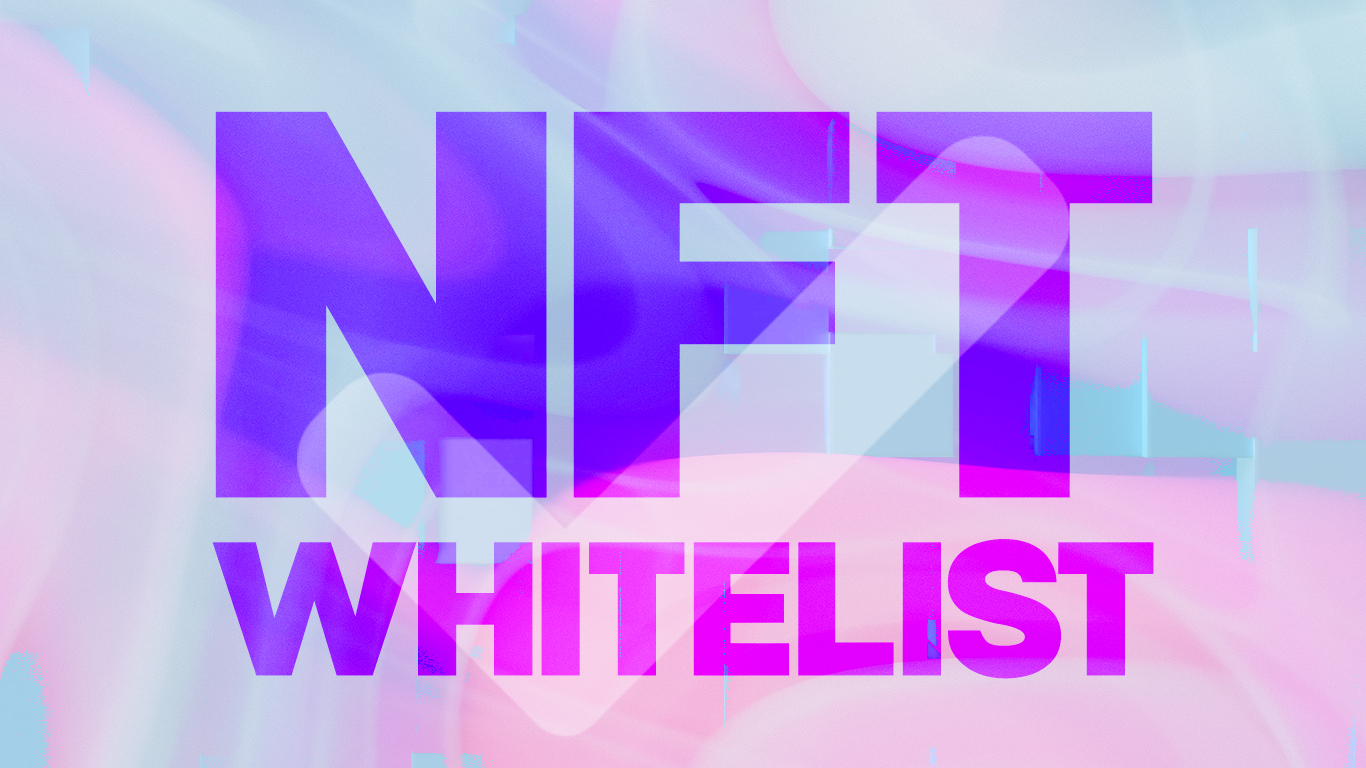More recently, non-fungible tokens, popularly known as NFTs, have been one of the trendiest topics on the internet. These digital items are quite famous as a result of their individual uniqueness and stupendous market prices.
NFTs are created from various forms of content, including paintings, videos, music, etc. And similar to art pieces, they can be flipped for a higher market price than when they were bought. This has led to many individuals, including world-renowned celebrities seeking to own these non-fungible tokens as a form of investment.
Therefore, the launch of any NFT project, especially one with much hype, is often met with intense competition among investors leading to crazy price levels and high transaction fees.
This intense demand also results in specific individuals whose efforts were vital in the project development, not being able to mint an NFT at the initial launch.
For these reasons, NFT whitelists were created to introduce a sense of fairness as well as reduce the pandemonium and chaos often associated with an NFT release.
In this guide, we shall discuss what an NFT whitelist is, its benefits, and how to get on an NFT whitelist.
What is an NFT Whitelist?
An NFT Whitelist is a database of crypto wallet addresses that are granted early access to mint an NFT from a project’s collection before its public launch date. When you get whitelisted for an NFT project, you are given a designated time slot, usually 48 hours, to mint the NFT before the official launch.
NFT Whitelists are curated by NFT projects to reward their early supporters with guaranteed access to the collection. In this context, early supporters refer to individuals who contributed significantly to the publicity and hype of the project in its primary developmental stages.
With a pre-launch mechanism like a whitelist, such individuals are able to easily purchase an NFT or multiple NFTs from their preferred collection, avoiding expensive secondary prices and high gas fees, which often result from the competition with other investors waiting for the project launch.
Why Do Projects Use NFT Whitelists?
Whenever a new NFT collection is released, its possible that thousands of interested investors will try to get a piece. This is because NFTs are designed with a certain exclusivity and limited supply, resulting in a heated bidding battle among all interested collectors.
Due to this fierce competition amongst collectors, certain issues began to plague the space, leading to the creation of whitelisting. Below are some of the top reasons why NFT projects have moved to using whitelists.
Prevent Gas Wars
Gas fees are the transaction fees that accompany any operation on a blockchain, including the minting of NFTs. That said, whenever a highly anticipated NFT is released, many investors often try to purchase the limited pieces of the collection at the same time. These numerous transaction requests often result in network congestion which slows down every operation on the blockchain.
In such instances, investors end up outbidding one another, willing to pay higher gas fees to get their transaction processed quicker to they can secure an NFT. This blockchain phenomenon is known as a “gas war.”
With the introduction of whitelisting, NFT projects have been able to reduce the occurrences of gas wars, as each whitelisted wallet is allotted a specific time to purchase tokens from the collection before the official release. Moreover, NFT whitelists reduce the number of potential investors waiting for the launch.
Prevent Scams
Due to the massive hype behind some NFT releases, bad actors are bound to take advantage on desperate investors. Fraudulent offers or phishing links are nothing out of the ordinary nowadays but it is still important for projects to try and combat these issues to keep everyone safe.
When announcing that whitelists will be used instead of a “first come, first serve” drop, there is less of a chance that users will fall for these types of scams.
Reward Early Supporters
Any successful launch requires a lot of publicity and hype, especially in its early phases of development. Many NFT enthusiasts come together to create this early hype, devoting time and resources to marketing the project on social media and building a community of interested investors and users.
Unfortunately, these early fans could miss out on the NFT sales due to the fierce competition that always occurs at the release point. In such instances, they could lose the motivation to promote future projects, which would be pretty detrimental to a space that thrives mainly on hype.
With whitelists, NFT creators are able to dismiss such incidents by ensuring all early supporters of their project are guaranteed a time slot to purchase a piece of the collection before the official launch date.
Best Ways to Get Whitelisted for an NFT Project
Assuming you’ve found a promising NFT project that hasn’t launched yet and you want to get a spot on the project’s whitelist, the first step would be to join the project’s discord server.
Discord functions as the most prominent social media platform for NFT projects, in which creators, enthusiasts and potential investors can interact freely with one another. You should also follow the project’s Twitter account to get the latest development and updates, as that’s where most of the community is active.
After completing these steps, you should check out the whitelist membership requirements for such a project and ensure to meet the stated criteria before submitting your application.
Now, it is worth noting that the steps stated above are basic and followed by thousands of NFT enthusiasts who hope to make the whitelist. That said, a whitelist is usually limited as not all applications are accepted. Therefore, aside from taking these steps, you may want to make extra efforts to increase your chances of getting a whitelist spot.
The following will give you the highest chances of getting whitelisted for an NFT project.
Join Early
Joining an NFT project in its early stages and playing an active role in its take-off is a great way to secure your spot on the whitelist. NFT projects typically reward their early supporters, making them the most likely to get whitelisted.
Be Engaging & Stay Engaged
Interacting constantly with other members of the project’s discord server and asking relevant questions from the NFT creators is often interpreted as a genuine interest in the project. This is key for you to get noticed and add more credibility to your whitelist application. However, make sure it’s not just a once-off interaction but rather check in once a day to show you’re truly interested in the project.
Participate in Giveaways/Competitions
Most NFT projects usually organize giveaways or competitions to increase their publicity on social media platforms (mainly Twitter) and maintain a thriving community. Having active participation in these events, even without winning, could positively affect the odds of you making the whitelist.
Expand the Community
Nothing excites NFT creators more than an influx of new community members. By promoting an NFT project on another discord group, you could bring in a new host of fans and potential buyers, boosting your chances of getting on the whitelist. To advertise an NFT on any discord server other than its own, you should post your promotion in the chat room allotted for such purposes.
Create Fan Art
If you are a creative person with time, you may want to consider creating and advertising personal designs which promote your wanted NFT. These fan arts, as they are called, are an incredible way to show your support for an NFT project. They are also massively appreciated by the creators who are in charge of approving whitelist applications.
Benefits of Getting Whitelisted by NFT Projects
By design, whitelists grant their members advantages over outside investors. Some of these benefits include:
Guaranteed Spot & Early Access
By making the whitelist of an NFT collection you will have exclusive and early access to mint a piece of that collection. Sometimes, you may even get discounted offers and a lower mint price than the public sale.
Don’t Pay Secondary Prices
Whitelists enable you to purchase an NFT directly from the creators at its base mint price. Therefore, you avoid having to purchase from other investors at secondary market prices that are usually quite exorbitant.
No Gas Wars
By having a designated time slot to purchase your NFT, you get to avoid having to outbid the competition for getting your transactions approved resulting in you saving ETH (or another token) in gas fees.
FAQs
Does whitelist mean you get a free NFT?
No, you do not get a free NFT. Getting whitelisted only means you are granted permission to purchase an NFT before it is officially released.
Can you lose money minting a whitelisted NFT?
Minting an NFT from its a whitelist does not mean you will profit from it. That is why you should conduct extensive research on the potential of each project you wish to be whitelisted for.
Can you purchase a spot on an NFT whitelist?
NFT whitelist spots cannot be bought as they serve as a reward to loyal supporters of the project. Anyone offering to sell a whitelist spot can be considered a scam.
Final Words
Being whitelisted grants you early and exclusive access to some of the most limited and hyped projects. You are able to avoid gas wars and mint NFTs at a low cost, allowing you to maximize your profit.
Getting on whitelists will require a lot of intentional effort, but with the right strategy and consistency, you will be rewarded for your efforts in the long run.








